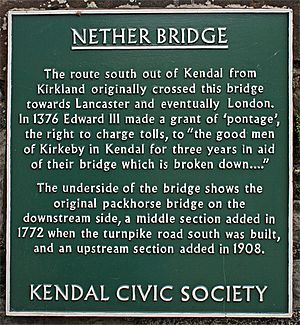Pontage facts for kids

Pontage was a special fee, like a toll, collected during the medieval era (the Middle Ages) in places like England, Wales, and Ireland. This money was used specifically to build new bridges or repair old ones.
Pontage was a bit like other medieval fees: murage was a toll for building town walls, and pavage was for paving streets or market places.
Contents
Why Bridges Were So Important
Building and keeping bridges in good shape was always a big challenge back then. Rivers could be dangerous to cross, and bridges were vital for travel, trade, and even armies.
Who Was Responsible for Bridges?
A very old and important document called the Magna Carta, written in 1215, had a rule about bridges. Item 23 said that no town or person should be forced to build bridges unless they were already legally required to do so.
Sometimes, special investigations were held to figure out who was responsible for bridge repairs. Often, the answer was "No one is responsible for the repair of this bridge!" If no one had a legal duty, the job then fell to the King.
How Pontage Helped
Because the King often had to pay for bridges, he would give out "grants of pontage." These were special permissions, called letters patent, that allowed people to collect tolls for a set amount of time. This money would then be used to cover the costs of building or fixing a bridge.
These grants were given out from 1228 until the 1440s. The very first ones were for bridges at Ferrybridge in Yorkshire and Staines, an important crossing point on the river Thames. In total, about 370 such grants were made.
In the Lordship of Ireland, pontage grants helped build bridges in many towns, including Clonmel, Kilcullen, and Leighlinbridge. Sometimes, the work wasn't finished by the end of the grant period, so people had to ask the King for an extension.
Pontage and Land
The word "pontage" was also used in Cambridgeshire. Here, it referred to certain lands where the owners were responsible for helping to repair the bridge of Cambridge. This was part of their tenure, meaning it was a duty that came with owning that land.
 | Isaac Myers |
 | D. Hamilton Jackson |
 | A. Philip Randolph |

